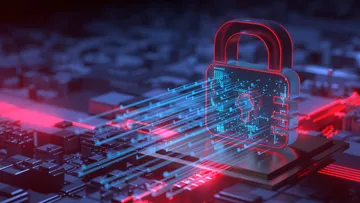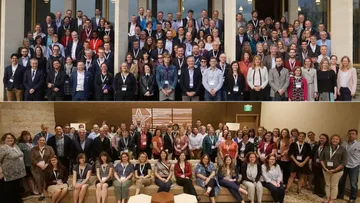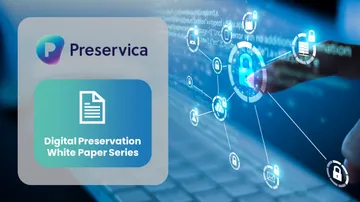Digital Preservation 101
New to digital preservation? Here’s everything you need to know about protecting your organization's most valuable assets.

We’re facing a digital challenge
The amount of digital information created by organizations is increasing faster than ever.
As digital transformation, digitization and application decommissioning programs gain momentum in every sector, the need for long-term digital preservation in businesses and organizations will only continue to grow exponentially. From finance to education, the key digital challenge in every industry is making sure unique long-term digital information can be easily retrieved, used and trusted for decades to come, even as digital formats change and evolve.
Every organization has important information that needs to be securely stored for 10+ years.
Only through digital preservation can organizations achieve long-term goals, such as:
Unlock value to drive innovation and competitive advantage
Mitigate risk by meeting compliance, regulatory and legal needs
Protect intellectual property, licenses and patents
Maintain records of good corporate or institutional governance
Preserve and share content of unique cultural or brand importance

Digital content has a shelf life.
All digital assets can be easily corrupted, lost, tampered with, or worse—stored in formats that can’t be read or used by future applications. This is a well-known risk called format obsolescence.
As digital formats evolve, gone are the days of Lotus 1-2-3, Wordstar, and WordPerfect. The formats we use today are at equal risk of being replaced, forgotten, and ultimately unreadable for future use. Only with proper digital preservation can organizations minimize the risks of lost information.
Content management, backup and storage setup isn't enough.

Many organizations have systems in place for managing short-term operational content, including content management, network drives, digital asset management, backups and archiving. But these methods have several shortcomings, including:
- No automated, at-scale way to update file formats over time
- Limited capabilities for proving trustworthiness
- Long lead times to find information on tape or in dark archives
While these systems form an integral part of the information lifecycle, they were never designed to ensure the accessibility and authenticity of digital information over decades. This is where digital preservation can help.

Any long-term solution needs to be cost-efficient.
Businesses and organizations always have to operate within budgets, which means any long-term storage and preservation solution needs to be ultimately cost-efficient.
Using a digital preservation system like Preservica is the best way to ensure secure long-term storage, fast and user-friendly retrieval, and reduced cost and performance burdens on line-of-business or legacy content management platforms.
Every organization has important information that needs to be securely stored for 10+ years.
Only through digital preservation can organizations achieve long-term goals, such as:





Storage for growing amounts of long term information needs to be durable and cost effective - this can be on-premise, in the cloud or a mix of both. Multiple copies stored across multiple locations mitigate the risk of outright loss. Active integrity checking and self-healing safeguards against any one copy becoming corrupted.
A searchable system that allows for rich metadata will make sure your information is findable and identifiable in the future. Check-sums and audit trails can prove the authenticity and trustworthiness of your most critical content - vital for legal disputes and demonstrating compliance.
This is at the core of what digital preservation is for - keeping content readable and usable regardless of the application it was created in. You need an automated system for migrating obsolete file formats to newer ones over time - at scale. Files might be migrated multiple times as technology turns over and older applications become obsolete or are decommissioned.
Information sitting in a dark archive or backup system is value waiting to be unlocked, because it's hard to access. Make content accessible in a secure and controlled way, and you can react quickly to compliance or legal challenges. With the right system, you can open your content up to internal departments, or even make it available to the general public.
Any system designed to protect and preserve digital information for the long term needs to be a seamless part of the overall information lifecycle. You need a solution that can automatically acquire, unpack and ingest new digital content at scale, from a variety of content management and line-of-business systems.

Security, guaranteed
Our software platform goes beyond secure storage by meeting strict archival and digital preservation standards (OAIS ISO 14721) to ensure top security at all times.

Global reputation
We’re trusted and proven at thousands of corporations, cultural organizations, educational institutions and government bodies.

A trusted name anywhere
We’re recognized in our field. Our product is built on over a decade of development and digital preservation experience across all major sectors.

Partners-first applications
We work with partners to provide end-to-end solutions that suit any organizational structure, from ingesting digitized content to integrating with existing information systems.

Always improving
We have a very active, global user community. Through sharing insights and best practice, the group shapes not only the direction of the Preservica product but the future of digital preservation itself.

Digital Preservation expert series
Learn how growing risks can be managed using sophisticated Digital Preservation technologies to help preserve the world’s digital memory:
